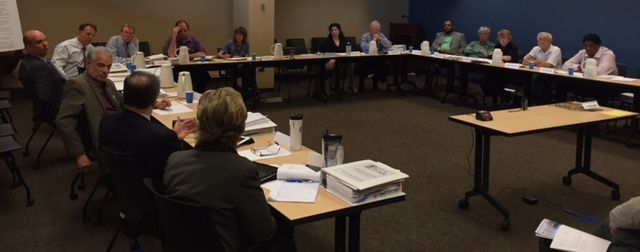As a citizens committee works to frame potential changes to the city’s charter, voters are divided on the issues they’re discussing, including elections and taxing limits.
Among the findings of a voter poll:
- 52 percent of city voters would oppose a half-cent sales tax if they didn’t know where the money was going.
- 74 percent would be more likely to support it if the money went to road repairs.
- 71 percent would be more likely to support it if the money went to keep the city from cutting police and firefighter jobs.
The results also show city voters are confused about their election system.
About 36 percent said the mayor and City Council should be elected citywide, while 26 percent said they should be elected only by the ward they represent, 16 percent like the city’s current hybrid system, and 23 percent said they aren’t sure.
The poll was conducted by phone to landlines and cellphones belonging to registered voters who live inside Tucson city limits. The demographic information provided by the pollster shows the voters surveyed were mostly older than 50 with no children living at home.
It was commissioned by the mayor and paid for by the Southern Arizona Leadership Council.
Citizens group moving slowly
The Charter Review Committee is responsible for advising the City Council on what changes to the city charter should be taken to voters in November, including possible changes to the election system and possible changes to self-imposed limits on taxes. The charter is the city’s constitution.
The group is on a tight deadline but moving slowly on complex issues.
In October the City Council asked the group to have recommendations by April 1 to meet the timeline to put questions for voters on the August ballot. To send questions to voters in November, the group would need to have recommendations by July.
Since the council’s instructions, the committee has met six times .
Some committee members said Monday they are confident they can finish their recommendations by the April 1 deadline.
In January the group considered a motion to keep the 2 percent sales-tax cap in place but allow the city to ask voters to approve an increase in a one-step process, but the group decided to wait for the poll results made public Monday — even though the committee has previously approved a similar proposal last year.
On Monday the committee members received the results they had been waiting for and decided to wait to discuss the results until members had time to think about the the results.
Chair Bonnie Poulos said progress is being made. Committee members are getting educated on the issues and developing their opinions.
The next meeting is March 7 and they intend to take preliminary votes .
The committee has had problems starting on time and meeting quorum requirements. Two meetings this month began with eight of 15 members present and more members arriving later.
The tax limit question is urgent because of the city’s budget crisis and the election-system question is urgent because of a November opinion from the U.S. Ninth Circuit Court of Appeals saying the city’s system unconstitutionally favors Democrats.
Mayor Jonathan Rothschild said he can assure the public there will be a question on the ballot no later than November, because there will be a City Council election in 2017 and voters and candidates need to know what system will be in place.
While the decision to send questions to the ballot ultimately lies with the City Council, Rothschild said the council is wise to let the group “spend substantial time working on the issues.”
Democrats dominate group
The Charter Review Committee also faces criticism from political minorities about being a committee of Democrats.
Poulos is a registered independent, one member is a registered Republican, and 13 members are registered Democrats. The members are appointed by the Democratic mayor and City Council members and by the city manager.
“You really don’t represent the people of Tucson, you represent a partisan political faction,” Pima County Libertarian Party First Vice-Chair Christopher Cole told the committee during a public comment time at a January meeting. “It will be seen that you’re working as partisan Democrats to keep the Democrats in power.”
Poulos said, “It makes for dysfunctional democracy to have every elected official from the same party.” But even among Democrats on the committee, opinions are all over the map.
A three-judge panel on the U.S. Ninth Circuit Court of Appeals said in a 2-1 split opinion that the city’s election system unconstitutionally favors Democrats.
The city is appealing the decision and asking for a review by an 11-judge panel.
City Attorney Mike Rankin said the city could hear from the Ninth Circuit this month or next about whether the request for an en banc hearing is granted, and the hearing process would then take a couple of months.
Tucson’s election system uses a ward-specific primary election and a citywide general election. Tucson voters chose this system in 1929, and it has survived many legal challenges. Voters have turned down proposed changes at least three times.
The lawsuit was brought by a group of Republicans, including national Republican committeeman Bruce Ash and several former candidates, who wanted the city to change its election system to a ward-only primary and a ward-only general election.
Ash has said one factor in his bringing the lawsuit was the Charter Review Committee’s inability to make a decision on the issue. The committee split on whether to recommend changes to the election system last year.





